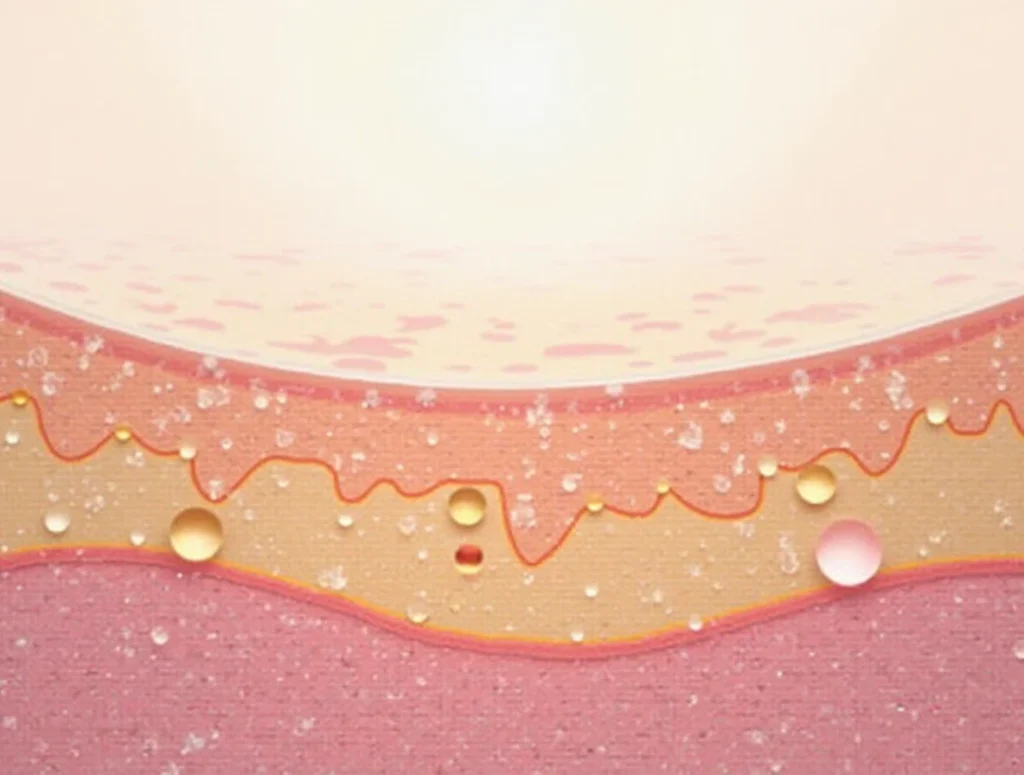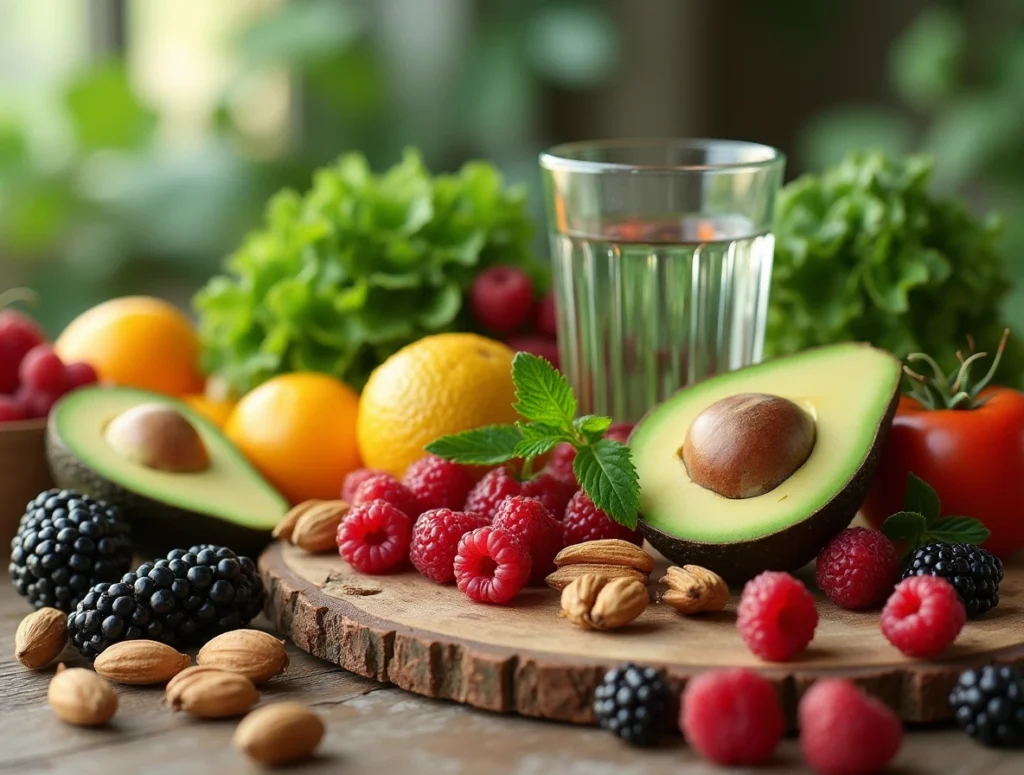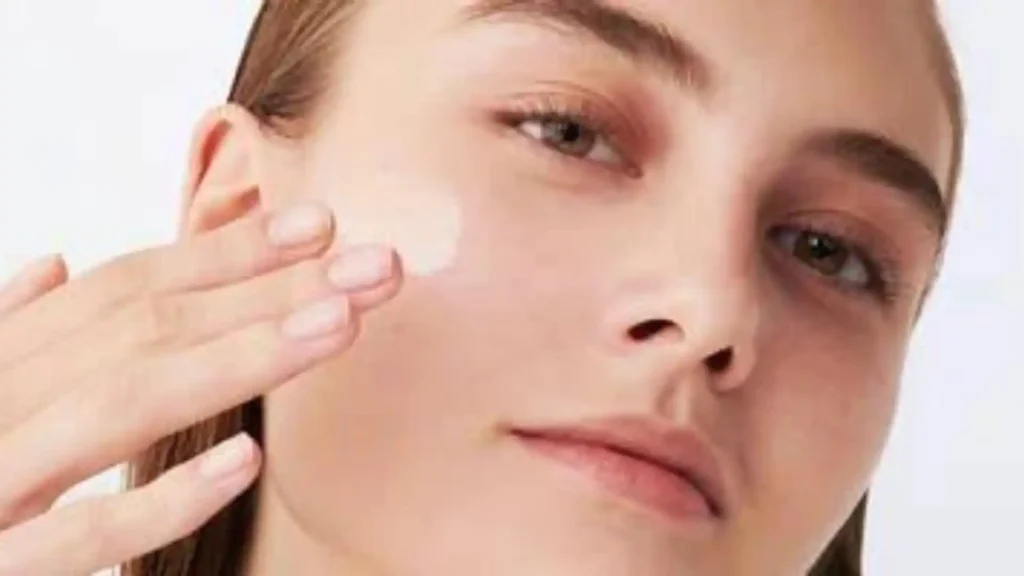Many people dream of having a radiant complexion. To get clear skin, you need good skin care habits, a healthy lifestyle, and the right products. Start by washing your face twice a day and using products that fit your skin type. This will help you on your way to clear skin.
The American Academy of Dermatology says to wash your face twice a day and after sweating to fight acne. This is key for clear skin. Using gentle, noncomedogenic products helps avoid clogged pores and acne. A clear skin care routine is vital for a glowing complexion, and the right tips can help you get there.
In this article, you’ll discover the best ways to get naturally clear skin. You’ll learn how to make a skincare routine, why sun protection is important, and how diet and hydration affect your skin. By following these tips, you can boost your skin health and get a radiant complexion. Clear skin is not just about looks; it’s about feeling good too, and the right care can help you feel both.

Understanding Your Skin’s Natural Balance
For healthy skin, knowing your skin’s natural balance is key. The skin barrier function protects your skin from outside harm. Keeping it balanced helps prevent skin issues. Diet, hydration, and sun exposure all play a part in your skin’s health.
A strong skin barrier is vital for healthy skin. What you eat and drink can impact your skin. Signs of good skin include a smooth look and no blemishes. By understanding your skin type and caring for it, you can keep your skin healthy and avoid problems.

The Skin Barrier Function
The skin barrier is your skin’s first line of defense. It keeps out pollution, UV rays, and harsh chemicals. A healthy barrier is crucial for skin health. Damage to it can cause dryness, irritation, and inflammation.
Factors Affecting Skin Health
Many things can affect your skin’s health. Diet, hydration, and sun exposure are important. Eating well and staying hydrated helps your skin. Too much sun can harm your skin barrier and increase cancer risk.
Signs of Healthy Skin
Healthy skin looks smooth and even, with no blemishes. It glows, feels firm, and has fewer wrinkles. By caring for your skin barrier and promoting healthy skin, you can get the glowing skin you want.
The Connection Between Diet and Clear Skin
Your diet is key to clear skin. Eating lots of fruits, veggies, and whole grains is good for your skin. On the other hand, too much processed food and sugar can cause skin issues.
Eating foods rich in antioxidants, vitamins, and minerals helps protect your skin. Omega-3 fatty acids in fatty fish reduce inflammation and keep your skin healthy. Drinking lots of water also improves skin hydration and elasticity.

A diet full of whole foods gives your skin the nutrients it needs. Foods rich in vitamins A, C, and E, and minerals like zinc and selenium, are especially good for your skin. Making smart food choices can help you achieve the clear, radiant skin you want.
Choose whole, nutrient-dense foods and cut down on processed and sugary ones. Drinking plenty of water is also important. Adding foods high in omega-3s and antioxidants to your diet can help. With a bit of planning, you can support your skin health and get the clear, healthy skin you desire.
Hydration: Your Secret Weapon for Clear Skin
Drinking enough water is key to clear skin. Water makes up 70% of our planet, showing its importance for our health, including our skin. Dehydrated skin can show wrinkles and signs of aging early, speeding up the aging process.
Water helps our skin stay young by making collagen. Collagen keeps our skin elastic. Drinking water regularly helps our skin cells work better, making our skin look younger and more vibrant.
Hydration keeps our skin strong against damage from the sun, pollution, and other harmful things. To stay hydrated, drink lots of water all day. Also, eat foods with lots of water like watermelon, cucumbers, and lettuce.
Hydration is even more important in winter or when it’s cold because our skin loses moisture. Drinking enough water helps keep our skin healthy, soft, and clear. So, drink plenty of water and eat hydrating foods to keep your skin looking its best.
Daily Water Intake Requirements
How much water we need varies. It depends on our individual needs for skin hydration. Finding the right amount is important for our skin health and overall well-being.
Hydrating Foods for Skin Health
Water-rich foods like watermelon, cucumbers, and lettuce help with daily hydration. These foods support skin health and help keep our skin clear.
Signs of Dehydrated Skin
Dehydrated skin shows wrinkles and aging signs early, speeding up aging. Knowing these signs helps us focus on staying hydrated for better skin health.
Essential Nutrients for Naturally Clear Skin
To get clear skin, knowing the importance of essential nutrients is key. Eating a balanced diet full of these nutrients helps keep your skin healthy. Vitamins C, E, and omega-3 fatty acids are especially important for your skin.
Eating lots of fruits and veggies can make your skin look better. Sweet potatoes, bell peppers, and leafy greens are packed with vitamins A, C, and omega-3s. Foods like fatty fish, eggs, and avocados also support your skin’s health.
Not getting enough nutrients can cause skin issues. Lack of vitamin A can make your skin dry and itchy. Not enough vitamin C can lead to easy bruising and slow healing. So, it’s vital to get enough nutrients for clear skin.
Eating right can help your skin stay healthy and clear. Talk to a doctor about your diet and how it affects your health. With the right foods and nutrients, you can keep your skin looking great and avoid skin problems.
Developing a Basic Skincare Routine
A consistent skincare routine is key to clear skin. Start by knowing your skin type and what it needs. This helps pick the right products for you.
Your routine should include cleansing, moisturizing, and sun protection. Clean your face twice a day to remove oil and dirt. Moisturize twice a day to keep your skin hydrated and protect it.
Morning Routine Steps
In the morning, start with a gentle cleanser. Then, apply a moisturizer to keep your skin hydrated. Finish with a broad-spectrum sunscreen with at least SPF 15 to protect against the sun.
Evening Routine Steps
In the evening, cleanse your face gently. Next, use a treatment product like a serum or facial oil for specific concerns. Finally, moisturize to keep your skin hydrated overnight.
Product Selection Guidelines
When picking products, think about your skin type and concerns. For oily skin, choose lightweight, oil-free options. For dry skin, go for rich, hydrating products. This way, you can create a basic routine for clear skin.
Natural Remedies to Achieve Clear Skin
Natural remedies can help you get clear skin. Aloe vera, tea tree oil, and honey are great for soothing your skin. They can make acne and other skin problems less noticeable.
Adding these remedies to your skincare routine can make your skin look healthy. You’ll be on your way to the clear skin you’ve always wanted.
Keeping a regular skincare routine is also key. Clean your face often, moisturize, and protect it from the sun. Drinking water and eating healthy foods is important too. These steps help your skin stay healthy and clear.
Home ingredients like oatmeal, yogurt, and egg whites can make great masks. They help with different skin issues. Using these natural remedies and living a healthy lifestyle can improve your skin.
Always test new skincare products first. If you have concerns, talk to a dermatologist. They can help you take care of your skin.
Lifestyle Habits That Impact Your Complexion
Your lifestyle habits can greatly affect your skin. Healthy habits like regular sleep, exercise, and managing stress are key. A well-rested body and mind are vital for good skin health.
Not getting enough sleep can lead to skin problems. Studies show it can cause dark circles and puffiness under the eyes to increase by 45%. Stress can also make your skin produce more oil, leading to acne and worsening conditions like eczema and psoriasis. But, exercising regularly can boost skin health by improving blood flow and nutrient delivery to the skin by up to 20%.
Sleep and Skin Health
Getting enough sleep is crucial for your skin. It helps the skin repair and regenerate itself. During sleep, the skin’s barrier function is restored, and collagen production increases, reducing fine lines and wrinkles.
Exercise Benefits
Regular exercise improves skin health by boosting blood flow and reducing inflammation. It also helps lower stress levels, which can lead to skin issues like acne and psoriasis.
Stress Management
Chronic stress can harm your skin, causing more oil production, acne, and other problems. Techniques like meditation, yoga, or deep breathing can help reduce stress’s negative effects on your skin.
By adopting healthy habits like regular sleep, exercise, and stress management, you can keep your skin healthy. Remember, a healthy lifestyle is key for overall health, including your skin.
Common Mistakes That Prevent Clear Skin
Getting clear skin can be tough because of common mistakes. Not removing makeup, not using sunscreen, and not drinking enough water are big ones. These errors can cause clogged pores, dryness, and irritation, harming your skin.
Not washing pillowcases often can lead to oil, dirt, and bacteria buildup. This can cause breakouts and skin allergies. Also, not cleaning makeup brushes and sponges often can spread bacteria, causing skin irritation and infections. Knowing these mistakes helps you make better choices for your skin.
Over-exfoliating can hurt your skin’s barrier, while not exfoliating enough can make your skin look dull and clogged. Finding the right balance is crucial for healthy skin. Using the wrong products for your skin type can also mess up your skincare routine and skin issues.
Avoiding these mistakes and making smart choices can help you get clear skin. Stay hydrated, remove makeup well, and use sunscreen every day to protect your skin. With the right habits and skincare routine, you can get the clear skin you’ve always wanted.
Environmental Factors and Skin Protection
When you want clear skin, think about how the environment affects your skin. Things like sun, pollution, and weather can harm your skin. Almost 75% of chronic diseases come from environmental factors.
The exposome idea shows how important the environment is for skin health. Pollution can cause dark spots on your skin. Tobacco smoke has over 3,800 harmful chemicals that damage your skin.
To keep your skin safe, use good skin protection. Use cleansers with vitamins C and E to fight pollution. Eating foods rich in vitamins C and E also helps protect your skin. By understanding and protecting against environmental factors, you can keep your skin clear and healthy.
Sun Protection Strategies
Sun protection is key because UV rays can harm your skin. Use sunscreen with high SPF and wear protective clothes. Niacinamide, a vitamin B3 form, helps prevent UV damage and boosts your skin’s defense.
Dealing with Pollution
Pollution can also harm your skin. Pollutants on your skin can cause oxidative stress and damage. Clean your skin well and avoid polluted areas to lessen pollution’s impact.
Climate Considerations
Climate affects your skin’s health too. Extreme weather can disrupt your skin’s balance, causing dryness or oiliness. Knowing how climate impacts your skin and protecting it can help you achieve clear skin.
When to Seek Professional Help
While a good skincare routine and healthy lifestyle are key, sometimes you need a pro’s help for clear skin. If you’re dealing with ongoing skin problems, it’s time to see a dermatologist. They can give you personalized advice and treatment for your skin.
A dermatologist can figure out what’s causing your skin issues and create a plan for clear skin. They can teach you how to keep your skin healthy. Whether it’s acne, dryness, or other problems, a dermatologist can offer valuable advice and support.
Getting professional help is a smart move for your skin health. A dermatologist can guide you through treatment options and find the best one for you. With their help, you can feel confident and in control of your skin health.
Remember, asking for professional help shows you care about your skin health. It’s a big step towards clear skin. Don’t wait to reach out to a dermatologist if you’re struggling with skin issues. With their expertise, you can get the clear skin you want and keep your skin healthy.
Building a Long-Term Clear Skin Strategy
To get and keep clear skin, you need a long-term plan. This plan should focus on skin health. It means sticking to a skincare routine, eating well, and being patient.
Studies show simple steps like washing your face twice a day and using gentle moisturizers help a lot. Eating foods full of antioxidants and exercising regularly also boost skin health. These habits can lead to clearer skin and better overall health.
It’s key to avoid bad habits like popping pimples or using harsh products. These actions can cause infections and scars, making clear skin harder to get. By choosing wisely and being careful with your skin, you can support its health and get the clear skin you want.
Following a long-term plan for clear skin can lead to lasting, healthy, and glowing skin. Be patient, consistent, and gentle with your skin. If you need help, don’t hesitate to ask a professional. With the right approach, you can get the clear skin you’ve always dreamed of and feel more confident.
Conclusion: Your Journey to Naturally Clear Skin
Getting clear skin is all about sticking to a holistic plan that fits your skin’s needs. This guide has shown you how to create a skincare routine that works for you. It helps your skin stay healthy and balanced.
Remember, getting clear skin takes time and effort. With good skincare, a healthy diet, and a lifestyle that supports your skin, you can get the skin you want. Stay on track and enjoy the journey to clear skin.
FAQ
What are the key factors for achieving naturally clear skin?
Clear skin comes from good habits, a healthy lifestyle, and the right products. It’s about knowing your skin, following a skincare routine, eating well, staying hydrated, and protecting your skin from the environment.
Why is understanding the skin’s barrier function important for clear skin?
The skin’s barrier keeps it safe from harm. Keeping it healthy is key to avoiding skin problems and getting a clear, glowing face.
How does diet impact skin health and clear skin?
Eating foods full of antioxidants, vitamins, and minerals helps protect and clear your skin. But, foods high in processed stuff and sugar can cause inflammation and skin issues.
What is the importance of hydration for clear skin?
Drinking enough water and eating hydrating foods is vital for skin health. It helps keep your skin clear and radiant.
Which essential nutrients are important for clear skin, and how can they be incorporated into the diet?
Vitamins, minerals, and antioxidants are crucial for skin health. Eating a balanced diet with these nutrients can help keep your skin clear.
What are the key steps in developing a basic skincare routine for clear skin?
A good skincare routine includes cleansing, toning, moisturizing, and using products right for your skin. Sticking to a morning and evening routine is key for clear skin.
What are some natural remedies that can help clear skin?
Natural remedies like essential oils, face masks, and DIY treatments can boost skin health. They can help you get a clear, glowing face when used in your skincare routine.
How do lifestyle habits impact skin health and clear skin?
Lifestyle choices like sleep, exercise, and managing stress greatly affect skin health. Making positive changes in these areas can help you achieve clear, healthy skin.
What are some common mistakes that can prevent clear skin?
Mistakes like over-exfoliating, using the wrong products, and not protecting from the sun can stop you from getting clear skin. Knowing these mistakes and fixing them is important for clear skin.
How can environmental factors impact skin health, and what can be done to protect the skin?
Things like sun, pollution, and climate can harm your skin. Using sun protection and adjusting your skincare to the environment can help keep your skin clear and healthy.
When should one seek professional help for clear skin concerns?
Even with good skincare and habits, sometimes you need a dermatologist for skin issues or underlying conditions.
How can one build a long-term strategy for maintaining clear skin?
A long-term plan for clear skin needs patience, consistency, and a commitment to healthy habits. Regularly check and adjust your skincare, diet, and lifestyle to keep your skin clear and radiant over time.
Discover more skincare trends:
- Aloe Vera Moisturizer: 9 Genius Ways to Simplify Your Life
- Natural Makeup Looks: 12 Expert Tips for an Effortless Glow
- Perfect Eyebrow Near Me: Book Your Stunning Look Today!
- Follow us on Facebook
- Follow us on Pinterest





